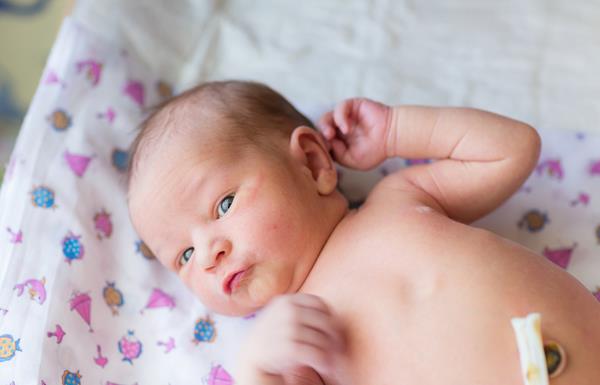After 1-2 weeks of birth, the newborn umbilical cord falls off. However, this time depends on the location as well as how to care for and clean the umbilical cord. What is left of umbilical cord loss in babies that mothers do not know yet? Let's find out together!
content
Properly clean the baby's navel
Watch out for unusual symptoms
Umbilical cord loss in a newborn takes place about 7-10 days after birth. However, this "schedule" is not entirely true for all kids. If a newborn's umbilical cord falls later, mothers do not need to worry too much, as long as the umbilical cord does not have any abnormal signs such as discharge, odor, umbilical cord swelling, redness ...

The time of umbilical cord loss in a newborn depends on health and daily care and hygiene
Properly clean the baby's navel
There are many factors that affect the timing of umbilical cord loss in a newborn . For example, if you give birth for the first time, your baby will lose the umbilical cord later than babies whose mothers have given births 2 or 3 times. Premature babies also often drop their umbilical cord later than full term babies. So, don't worry if your baby's umbilical cord falls out later than usual, as long as your baby's navel doesn't drain, is swollen, red, has a bad smell or has any other unusual signs. You just need to clean your baby's navel with normal saline and leave the navel open.
Some important notes when cleaning the umbilical cord for babies, don't forget!
Not cleaning with alcohol: The current types of alcohol are not of good quality, in addition, it is also easy to irritate the delicate skin of children. Therefore, experts recommend that mothers should clean the umbilical cord with dilute salt water.
Keep the umbilical cord dry: Until the baby's navel falls off completely, mothers should avoid soaking the baby's navel for too long in water, especially while bathing the baby.
Exposure to the navel as much as possible: Not only will it help it dry faster, it will also help reduce the risk of infection. Note: When wearing a diaper, mothers should fold the diaper under the navel to avoid letting waste stick to the navel.
Absolutely not break the umbilical cord: The process of umbilical cord loss in newborns will take place naturally, without any intervention. The navel will fall off on its own after it dries. Unintentionally pulling out the umbilical cord before the necessary time can cause bleeding, and increase the risk of umbilical cord infection.

6 points do not miss when taking care of a newborn. You know, newborn babies are fragile and sensitive. Every part of your baby's body needs care, whether it's just the nails or the hair. Mom, do not focus too much on one area but forget the rest
Watch out for unusual symptoms
The newborn umbilical cord is not falling, if not well cared for, will create opportunities for bacteria to enter, causing infection. Mother should be wary of the following infections:
- Purulent cord inflammation
The recognizable signs are very clear: The umbilical cord is swollen, the navel smells bad , wet, and draining pus. In cases of umbilical cord inflammation with mild pus, mothers can take care of at home by squeezing out the pus, washing the baby's navel with hydrogen peroxide, drying it, sprinkling with antibiotic powder, then dressing. However, if the child has more severe symptoms such as high fever, not breastfeeding, fatigue…, the mother should bring the child to the hospital for prompt examination and treatment.
- Umbilical vasculitis
After the baby is born, the umbilical blood vessels include 2 arteries, 1 vein will collapse and vulcanize. However, if not cleaned properly, bacteria can enter umbilical blood vessels, causing inflammation.
If you notice that the abdomen below the navel is swollen, red, stroking the abdominal wall from the pubic bone to the navel will have pus flowing, the baby is at risk of umbilical artery inflammation. Conversely, if you claw down from the top of the breast and see pus drain, the risk of your baby getting umbilical vein inflammation is very high. In the case of an infant with umbilical vein inflammation, the bacteria can attack neighboring areas such as the liver and bile, leading to serious sepsis.

Some common problems in babies Sometimes babies are a bit abnormal and fathers and mothers need to keep an eye on them to decode them. Some are cool, while others talk about complex health issues.
- Umbilical tetanus
Children with umbilical tetanus will have a fever, stop feeding, then stiffness of the jaw, and body spasticity. If there is light or sound, the seizure will be worse. In severe cases, the baby can have spasms leading to difficulty breathing and death.
- Umbilical tumor
Although a newborn's umbilical cord falls off prematurely, the baby has no fever, the umbilical cord is not swollen or red, but if there is still a yellow fluid in the umbilical cord, the mother should pay special attention. Your baby is at risk for umbilical granulomatosis. If not treated in time can lead to umbilical cord infection.
In short, the process of umbilical cord loss in a newborn depends on the location, health as well as the hygiene and care of the umbilical cord. You do not need to worry too much if the baby's umbilical cord falls out later than the standard "schedule". However, if there are any abnormal signs, the best mother should take the baby to the hospital to check. Umbilical cord infection, if not treated in time, can lead to many negative effects on the baby's health.














